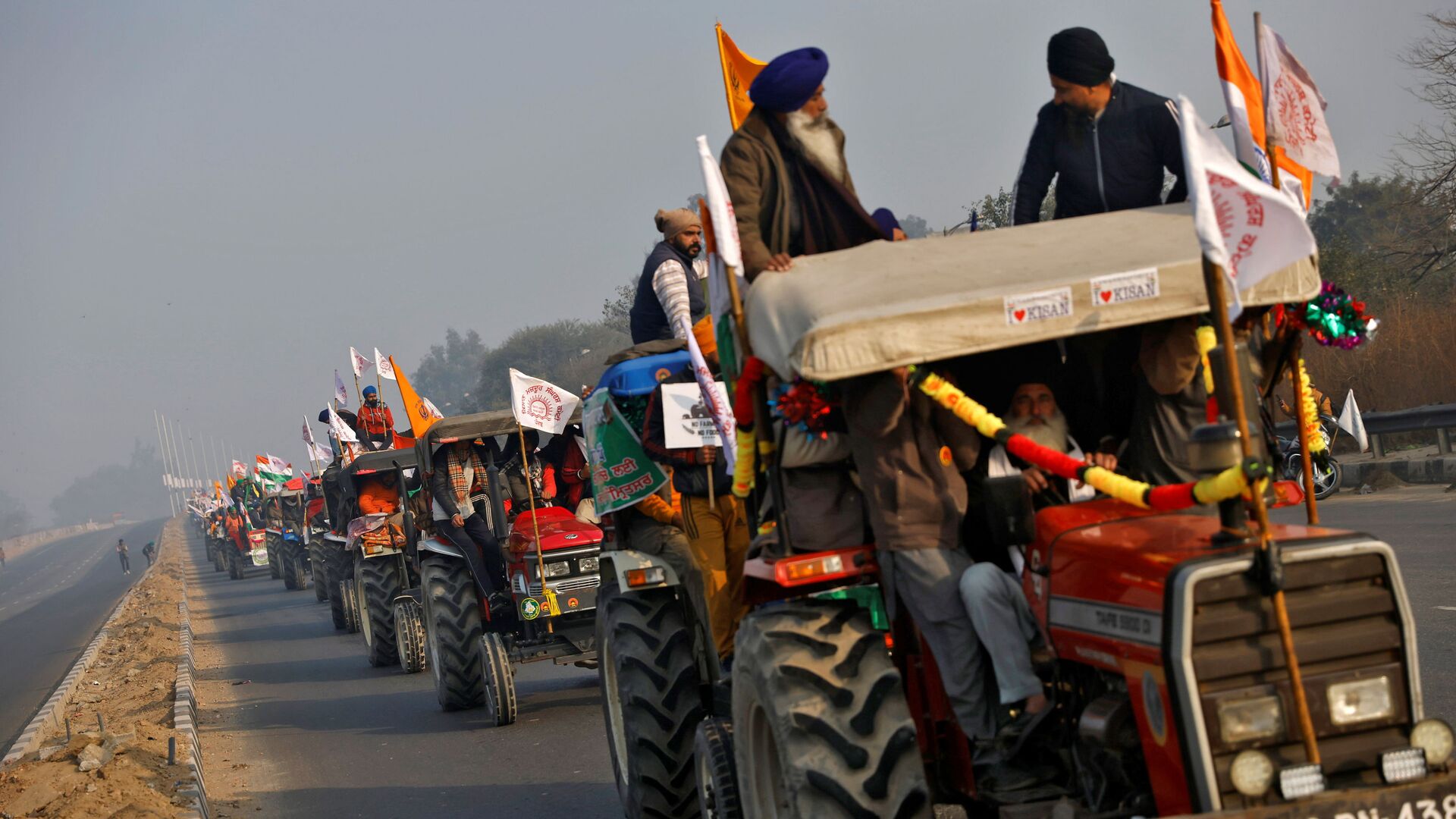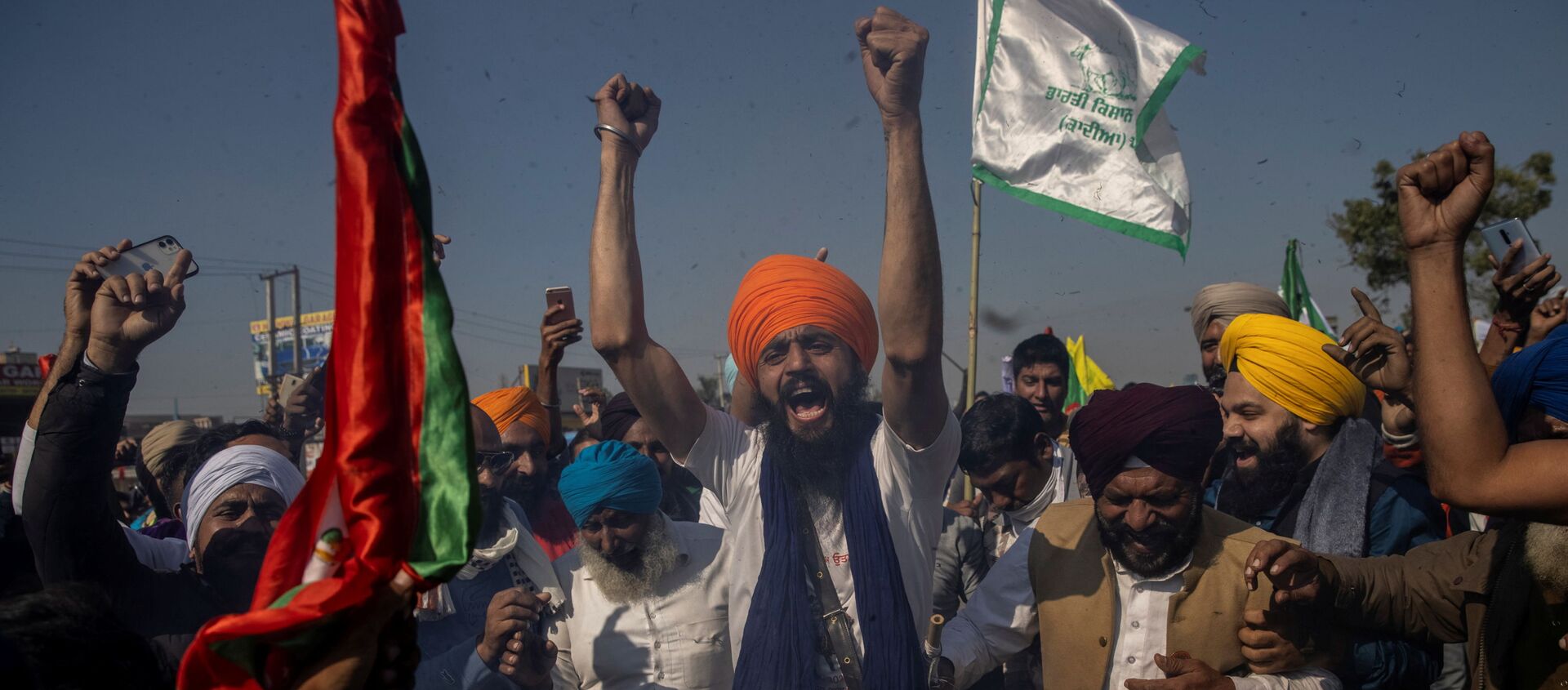Farmers across India on Friday morning kickstarted a 12-hour national shutdown called "Bharat Bandh", marking exactly four months since they first started their agitation against three new farm laws on 26 November around New Delhi.
As part of the mass movement, farmers have blocked the Delhi-Ghazipur border causing traffic police to re-route commuters. Protesting farmers in the city of Ambala have blocked the historic Grand Trunk road as well as the railway track near Shahpur. In Punjab as well, farmers have blocked rail tracks and highways in a bid to draw the government's attention to their agitation.
During the day-long national strike, all businesses as well as rail and road traffic will be non-operational, however, essential services will remain unaffected, the Samyukta Kisan Morcha (SKM), a coalition of farmers' unions that called for the strike, said.
"We will be here until the government scraps the law", Kulwant Singh Sandhu, a 70-year-old member of active farmer union Samyukht Kisan Morcha (SKM) told Sputnik. "This is the season of work and many of us are bearing the losses by not being in the field but here protesting for our cause. But it's okay".
Images of deserted bus stations and closed shops have emerged online. Pictures and videos of protesting farmers making arrangements for the strike have also surfaced on Twitter.
The Samyukta Kisan Morcha, wch has gvn a call 4 Bharat Bandh or a countrywide strike on March 26, has appealed to people to make it a success.The strike in protest against d 3 contentious farm laws enacted recently will be observed d entire day, frm 6 am till 6pm#आज_भारत_बंद_है pic.twitter.com/cit3ljYyCS
— J!ndMaan✴️ (@TheMaans) March 26, 2021
Kaithal Bus Stand could be seen barren in view of 12-hour Bharat Bandh.#आज_भारत_बंद_है pic.twitter.com/gQCLiayu4Z
— Tractor2ਟਵਿੱਟਰ (@Tractor2twitr) March 26, 2021
#BharatBandh : 1. visuals at Jagraon, district #Ludhiana
— raakhijagga (@raakhijagga) March 26, 2021
2. NH- 7 ( #Bathinda- #Chandigarh ) road, location of dharna: Bhikhi district #Mansa .
3. no traffic movement inside #Mansa city area pics credit @EktaBku @IndianExpress @iepunjab pic.twitter.com/iV9mYnGC5r
#Bharatbandh: A view of NH-9 near village #Lambi of #Punjab. It falls in the constituency of @Akali_Dal_ patron #ParkashSinghBadal . Preparations on before a day long #Chakkajam by Akali dal on this highway. Pic credit : Lambi villagers @IndianExpress @iepunjab pic.twitter.com/tbXXY5oiy2
— raakhijagga (@raakhijagga) March 26, 2021
#Bharat_Band: Farmers protest going on Airport road near ISB, Mohali . @iepunjab @IndianExpress pic.twitter.com/cGiJ5m6Ydi
— Jasbir Malhi 📸 جسبی ملہی (@JasbirMalhi1) March 26, 2021
This is the second nationwide strike announced by farmers after one was observed on 8 December.
The two new farm bills and one amendment that have stirred the controversy are the Farmers (Empowerment and Protection) Agreement of Price Assurance and Farm Services Act, 2020, Farmers Produce Trade and Commerce (Promotion and Facilitation) Act, 2020, and the Essential Commodities (Amendment) Act 2020. They were passed during the monsoon session of the parliament in September of last year.
Several rounds of discussions between farmer leaders and the government have yet to bear fruit.
Presently, leaders from all major political parties like the ruling Bharatiya Janata Party (BJP) and Indian National Congress (INC) are busy touring the states of Kerala, Tamil Nadu, Puducherry, West Bengal, and Assam – that will be witnessing Assembly Elections on 27 March.
In light of election campaigning, the government has not called for an official meeting with the farmers since 22 January, 64-year-old Jagmohan Singh, who is a member of the All India Kisan Sangharsh (farmer agitation) Coordination Committee, told Sputnik. He also added that government representatives, however, visit the protest sites from time to time for informal dialogues.
Over these past few months, farmers across India have extended solidarity with their counterparts protesting in Delhi. Over 300 farmers have died amid protests due to natural causes, extreme weather conditions, and even suicide.
"We have borne harsh winters as well as occasional rain showers. Summer is the season of farmers — stay in the field. We will easily go through it too. Farmers from Punjab and Haryana are under pressure to return to their fields as it is harvesting season. We have asked our brothers back home to start sending people in batches to work in the field. Now, replacing men, women are joining the protest sites. On 8 March, which was International Women's Day, 1,200 women from farming families reached Delhi's Tikri Border to hold the fort. Around 500 of them are still camping at the protest site and the others have gone back to work in the fields", said Jagmohan Singh, who is also the office bearer of the Bharatiya Kisan Union (BKU) in Punjab.




